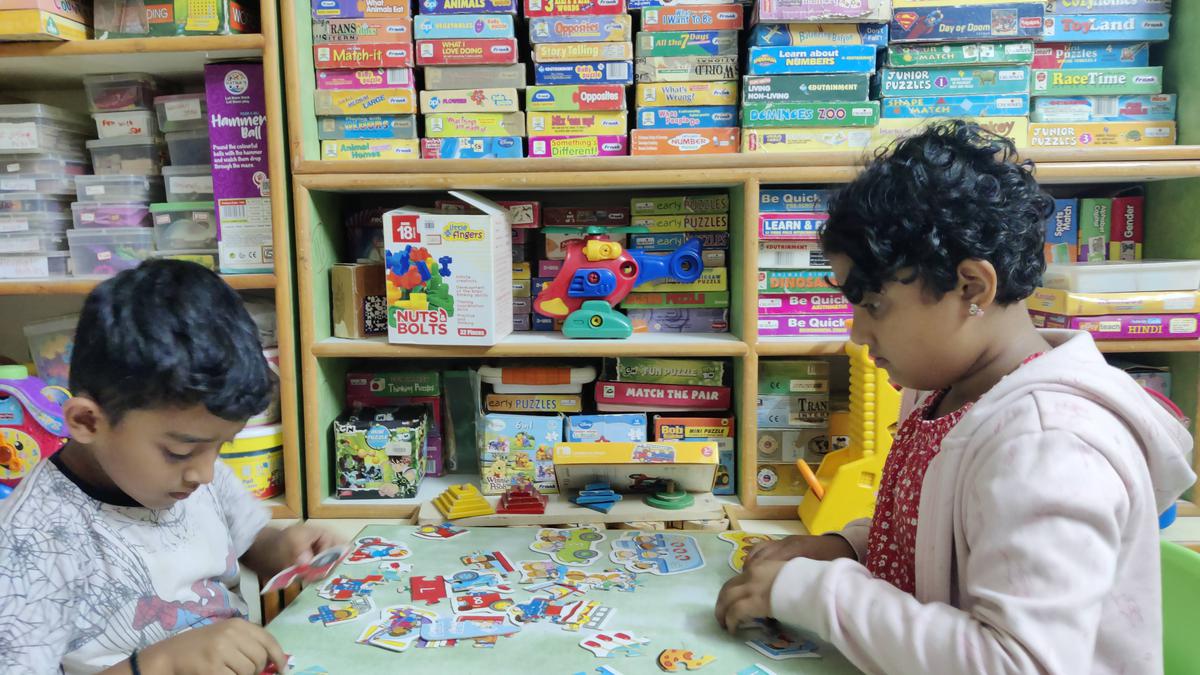
Despite a sustainable and engaging model, why are toy libraries finding few takers? Premium
The Hindu
Toy libraries offer cost-effective alternatives to buying new toys, access to diverse selection, and teach responsibility. Despite the advantages, they find few takers. Challenges include cultural mindset of individual ownership and lack of awareness. We look at a few players in Bengaluru such as Toyflix, ThinkBox, Unnati Books and Toy Library
In mid-2020, Bengaluru-based Vikram Madhusudhan found his home, and that of his friends’, cluttered with toys but their children glued to screens. The father of a 2.5-year-old son then, he decided to quit his job as a quality manager at Boeing to pursue his entrepreneurial aspirations in the child-learning space. Two years later, Vikram with his brother-in-law, Bhanu Teja, launched Toyflix (toyflix.in), a toy library that specialises in STEM and educational toys.
“I realised I was spending a lot of money on toys, and I was reluctant to part with them due to their sentimental value. The children, however, lose interest in them within a few days,” he says, adding that due to a child’s short attention span, parents are hesitant to invest in expensive STEM and educational toys that are crucial for brain development.
These were the exact two reasons that prompted Sameena Shaikh to start Bundle of Joy last year. The mother of two says the idea sprung from a conversation she had with her mother about a popular baby rocker she bought for her son who was born during the second wave of the pandemic. “I put a lot of effort into the purchase as it wasn’t available in India, but my baby didn’t take to it. This is the same with toys as they get bored of them fast, so I figured renting them would be easier,” says Sameena.
The pioneers
Despite such young players entering the market, the concept of toy libraries is still nascent in India. Bhakti Shah, a pioneer of sorts who launched ThinkBox (thinkbox.co.in) in 2008, says such initiatives are yet to find takers due to poor awareness among the public. A software engineer by profession, she left her job after her son’s birth in 2000, but was excited to see the potential libraries held. “From my earlier visits to Europe and the USA, I realised the possibilities were endless. I recall a seven-storey public library in Copenhagen that had a section for Hindu music LPs!” says Bhakti who started her library for books and toys in a 100 square foot rented shop with 500 books and 200 toys. “I met with distributors and publishers, and saw the products in person before buying them.”
Today, ThinkBox operates from a one-bedroom apartment with a catalogue boasting over 10,000 books and 800 toys. “The response has been good, and we now have 115 members,” says Bhakti.
Neha Jindal, who started a franchise of Mumbai-based Unnati Books and Toy Library (unnatilibrary.com) in 2016, agrees that the concept is yet to pick up in India. “Play as a form of learning is a fairly new concept in our country, and most parents don’t look at toys as essential for a child’s development, but only as a source of entertainment.” Having said that, she is quick to add that new-age parents are more involved with their children and understand the importance of toys, books and board games for their holistic development.

The Leela Palace Chennai presents the seven edition of Shefs at The Leela in collaboration with ‘Dean With Us’ — the mother-daughter duo of Rupali and Akansha Dean. The event honours the transformative role of Indian women chefs who are shaping the future of gastronomy. After past editions hosted across Bengaluru, Gurugram, Chennai, and Jaipur, the seventh edition in Chennai will bring together four women chefs — Sambhavi Joshi, Taiyaba Ali, Sehaj Ghuman and Bunuma Patagiri, who will bring their years of expertise into curating a menu that speaks both of their work and India’s diverse culinary heritage.





















 Run 3 Space | Play Space Running Game
Run 3 Space | Play Space Running Game Traffic Jam 3D | Online Racing Game
Traffic Jam 3D | Online Racing Game Duck Hunt | Play Old Classic Game
Duck Hunt | Play Old Classic Game










